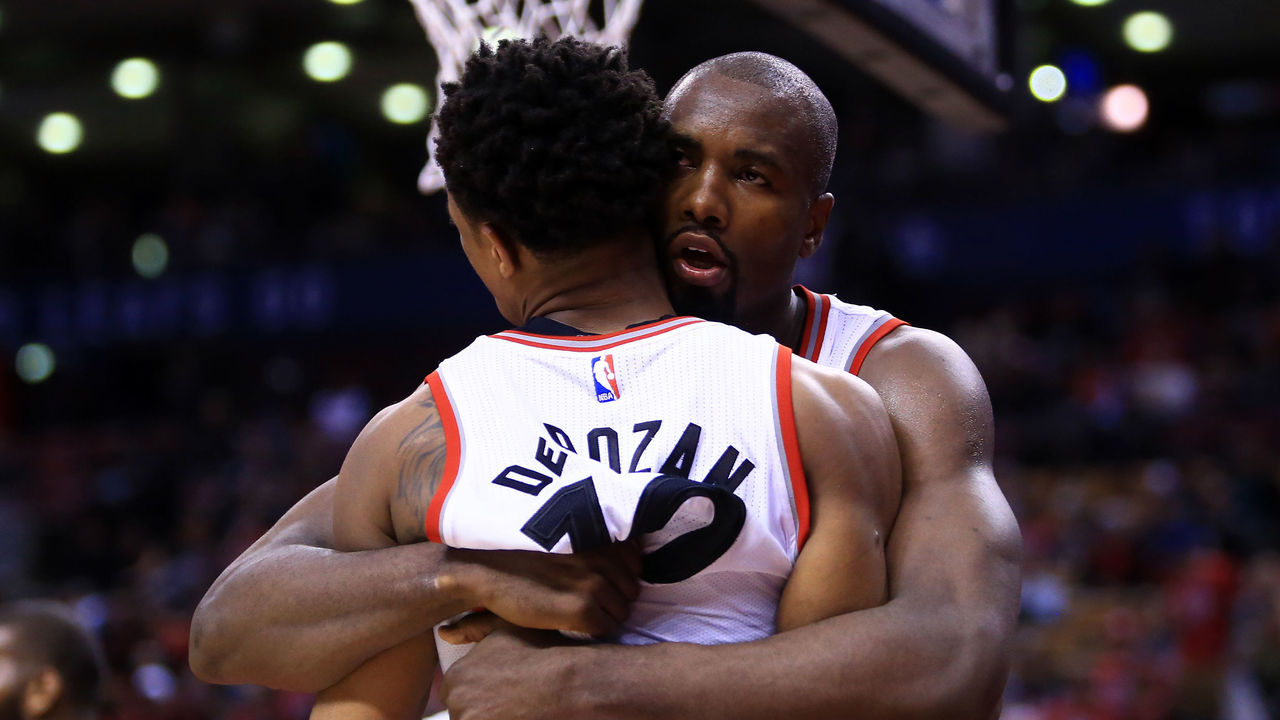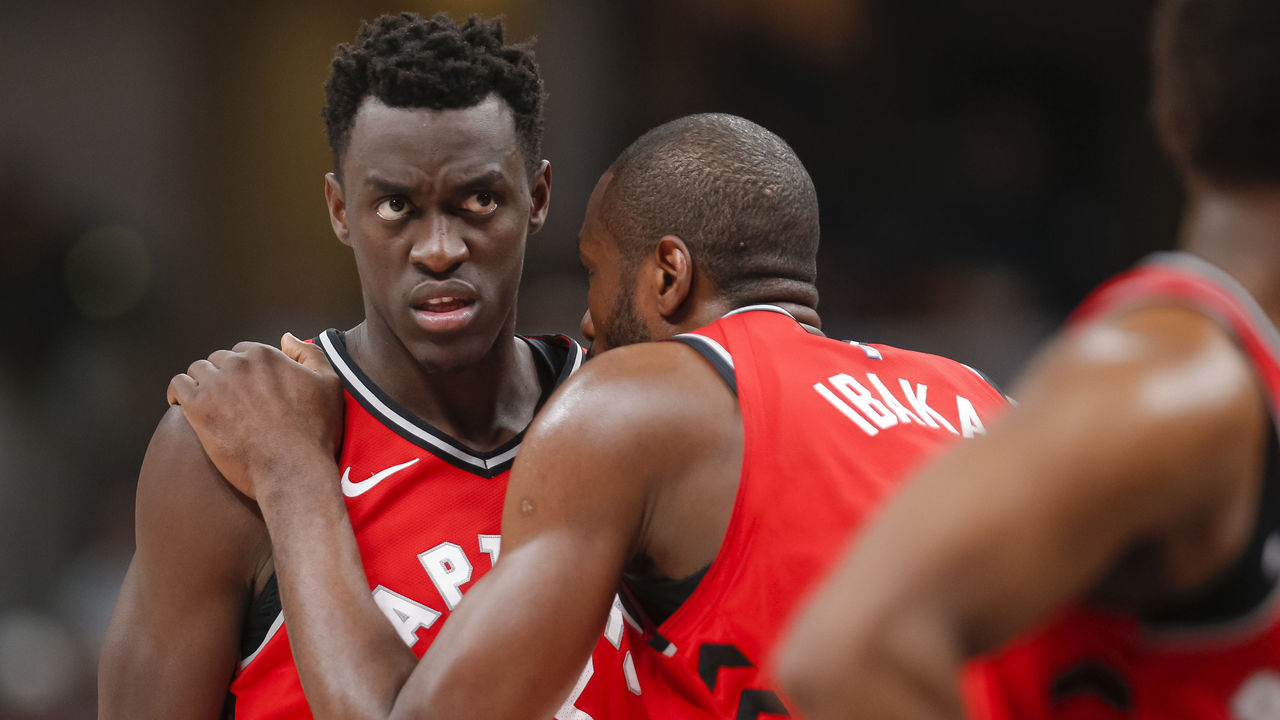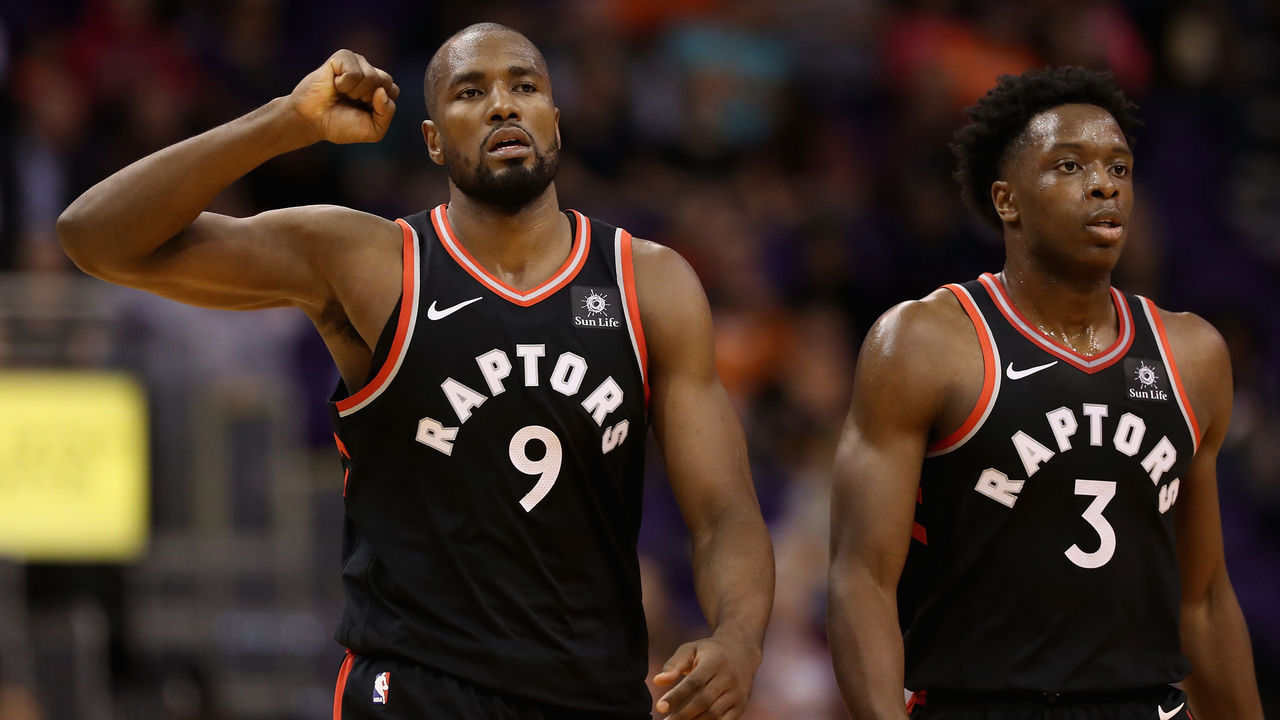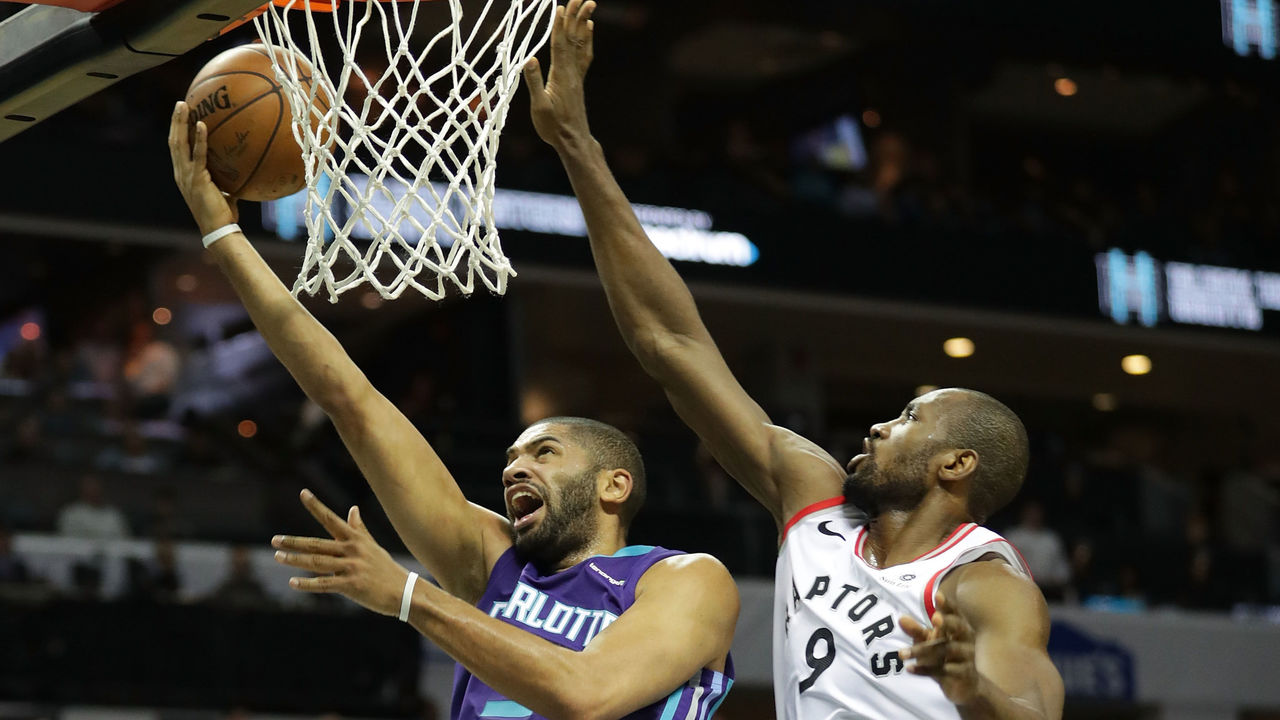To succeed in playoffs, Raptors need Ibaka to be who they signed him to be
When the Raptors acquired Serge Ibaka at last year's trade deadline, the enthusiasm in Toronto was palpable. Here was a player Masai Ujiri had long coveted, a guy who'd been a key component of some of the best teams of the decade, brought over to shore up a position that had been a soft spot for the team ever since Chris Bosh decamped for Miami and prompted DeMar DeRozan to announce himself as the franchise's life raft.
For so long it felt like the Raptors had been searching for an ancillary star to relieve some pressure from their dynamic backcourt of DeRozan and Kyle Lowry. Early on it seemed destined to be homegrown center Jonas Valanciunas, but he proved too plodding, too vulnerable in certain matchups to be a reliable third pillar in a league that rapidly skewed faster and more space-conscious around him. Other would-be tertiary stars had briefly burned bright and flickered out. Amir Johnson was an advanced-stats demigod who never ascended from floor-raiser to ceiling-raiser. Terrence Ross possessed all the physical tools to be the platonic ideal of a 3-and-D wing, but none of the focus, and he was ultimately dealt for Ibaka. Norman Powell teased greatness with his athleticism, work ethic, and precocious playoff heroics, but his development flatlined.
Ibaka seemed like he'd be that guy. He profiled as a perfect fit alongside their two guards; a pick-and-pop weapon who didn't need time with the ball to be effective offensively, and who could also paper over the pair's struggles containing dribble penetration with his high-end rim protection and ability to corral ballhandlers. The Raptors paid him like a third star last summer, but things haven't entirely worked out that way.

It's not that Ibaka hasn't brought those plug-and-play skills to the table, or that he's been a worse fit than advertised; it's that he's somehow been more maddeningly inconsistent than the guy the Raps traded for him. The team has managed to take a meaningful step forward anyway, but Ibaka's contributions have felt more peripheral than essential to that progress. He's still third on the team in minutes, and is almost always on the floor in crunch time, but it's not like he's formed some three-headed monster with DeRozan and Lowry. No one player has. Instead, it's been the Raptors' 12-man depth and flamethrowing bench mob serving that role; a third star by committee.
The jury's still out, though, on whether that model can hold up to postseason scrutiny. The Raptors have been propped up by a bench that's stocked with young players who've gotten virtually no run in the hothouse of the postseason. Ibaka has no such holes in his resume. He's played in the playoffs seven times in eight seasons, made at least the second round six times, and made at least the conference finals four times. He's the only current Raptor who's played in the Finals. He helped the Thunder drive a stake in the Kobe-Pau Lakers and topple a near-dynastic Spurs team back in 2012. Four years later, he helped the Thunder demoralize a 67-win Spurs team and nudge Tim Duncan into retirement, before going tete-a-tete with the 73-win Warriors. If nothing else, he can probably be relied upon to not get shook by, say, the Goran Dragic-led Miami Heat in the first round this year.
That's valuable experience for not just him but for his younger, greener teammates to lean on. The importance of it isn't lost on Ibaka.
"With my experience, I talk a lot with the young guys, and if I see something, I try to help," Ibaka told theScore last week. "When I used to play (in Oklahoma City) I had a guy like Kendrick Perkins in front of me, he used to help me a lot. You know, Nick Collison, he always used to help me. So, it's cool, that's how it goes.
"Now it's my turn."

The Raptors haven't needed a consistent third option during the regular season, but come playoff time, when the pressure on every link in the chain increases, there's a good chance they will. Ibaka is still the player most capable of assuming that role, not just because of his experience but because of the lineup flexibility he offers with his combination of size, shot-blocking, switchability, and shooting.
His duties have been diminished this season because each of the Raptors' other rotation bigs has taken a meaningful step forward. Valanciunas has improved as a playmaker, expanded his range to the 3-point line, and become a more intuitive back-line defender in a more conservative pick-and-roll scheme; Pascal Siakam has added plus ballhandling, passing, at-rim finishing, and on-ball defense to his list of qualifications; and Jakob Poeltl has quickly mastered verticality (Poelticality?) to become one of the league's best rim-protectors.
But it will be harder for Siakam to stay on the floor when disciplined playoff defenses track him in transition and ignore him in the halfcourt to choke off the paint, the way the Celtics did Saturday. Valanciunas remains a hesitant long-range shooter, and a significant liability against stretch-fives. Poeltl offers no spacing, can't really put the ball on the floor, and can't stop racking up fouls, justified or not. Ibaka may not be the scorer Valanciunas is, or the switch defender Siakam is, or even the shot-blocker Poeltl is at this point, but the fully realized version of him offers a combination of their skills that makes him more matchup proof than any of them.
What's worrisome is that for large portions of this season, that version of Ibaka has existed only in theory. His block rate is the lowest of his career, and he ranks last among Raptors bigs in opponent field-goal percentage at the rim. There have been a lot of games, particularly during the team's compressed March schedule, where he hasn't looked at all comfortable defending in space. As DeRozan more concisely put it back in December, "Sometimes he look like he's 28, sometimes he look 38."

As Ibaka's defense has shown cracks, so too has the team's. After ranking third in the league with a 102.6 rating through the season's first four-and-a-half months, they ranked just 18th in March, with a 108.0 rating that swelled to 110.6 with Ibaka on the floor. As a consequence, they've lost four of their last seven games, which is the closest thing to a slump they've experienced during a season in which they've yet to lose more than two games in a row.
But Ibaka's experience also affords him perspective, and there's a prevailing hypothesis (or at least a hope) that he's saving his energy for when it matters. More than perhaps any other Raptor, he would understand the value in pacing oneself. And have you heard that there are no back-to-backs in the playoffs? Ibaka himself says that come mid-April, he'll be able to ratchet it up another gear.
"Oh, yeah. Trust me," he told theScore, a few hours before putting in one of his strongest all-around efforts of the season in a win over the Denver Nuggets.
"(Inconsistency) is normal. Nobody gonna be perfect all year, trust me. Nobody. But good people always find a way to bounce back, so that's what it is. I've been there before, and we've been there before a lot worse than this. So, it's nothing."
The Raptors would be glad to take his word for it, because a 28-year-old-looking Ibaka takes them to another level. He was instrumental in getting them past the Bucks last spring, thanks in part to his ability and willingness to consistently meet Giannis Antetokounmpo at the rim, which was a must for a team that had (and has) no hope of deterring Antetokounmpo one-on-one (the Bucks project to be the Raptors' first-round opponent for a second straight year). Against the Cavaliers - who the Raptors will likely have to go through, for a third straight year, if they're to win the East - a spry Ibaka offers the only real chance of counteracting terrifying five-out lineups featuring Kevin Love at center. An un-spry Ibaka, as we've seen, does no such thing.
When Ibaka has his second-jump burst, plays with energy, gets his legs into his jumper, and, most importantly, is active around the rim and on the boards, the Raptors are incredibly difficult to beat. It's not like they need him to do anything earth-shattering, or even do all of those things in the same game. They're 24-5, for instance, when he grabs at least seven rebounds, and 33-9 when he has at least one offensive board.

Of course, Toronto also needs Ibaka to hit open shots - a perpetual struggle for the team's role players in the playoffs - and he can't exactly effort his way into more 3-point makes. Like the rest of his game, his shooting has been insanely streaky this season. He's shot .505/.383/.861 in wins, compared to .419/.279/.732 in losses, and his true shooting percentages by the month paint an almost eerily symmetrical portrait of peaks and valleys: 66.5, 51.9, 63.3, 51.2, 65.4, 51.8.
When playoff defenses pack the paint, blitz pick-and-rolls, and force the ball out of Lowry's and DeRozan's hands, those valleys are going to feel like the pits of hell. The Raptors have to live with the volatility, and hope the peaks come at the right times. It's hard to control the outcome of something predicated mostly on instinct and muscle memory, but, as TSN's Josh Lewenberg reported last week, Ibaka has been doing all he can in the lead-up to the postseason: staying late after practices to put up hundreds of extra jumpers, and even seeking out teammates' advice during a prolonged shooting slump that he seemed to finally break out of with a 3-for-3 night from deep against the Celtics. It also helps that he's added some new wrinkles to his offensive repertoire, like a pump-and-drive game that now includes kickout passes to corner shooters, and a refined touch that has him shooting a team-best 52.8 percent from floater range.
Thunder head coach Billy Donovan, who had Ibaka under his watch during his first season on an NBA sideline in 2015-16, emphasized the consistency of Ibaka's process, if not the results.
"To his credit, the year that I was with him he put in a lot of time and effort to continue to grow as a player," Donovan told theScore shortly before Ibaka clanked nine of 11 shots against his former team last month. "He was always consistent in that area."
Coach Dwane Casey, who's as process-oriented as they come, has consistently stressed that Ibaka's shooting is less important than how he contributes when his shot isn't falling.
There have been plenty of examples of the latter this season, most recently in that Nuggets game - when Ibaka helped limit Denver to 7-of-18 shooting in the restricted area - and most memorably against the Bucks on New Year's Day. Most will remember that as the game DeRozan poured in a franchise-record 52 points, but Ibaka quietly had one of his most impactful performances as a Raptor. Despite shooting 5-of-19 from the field and 0-of-5 from deep, he was wholly engaged defensively, poking deflections and steals, stymieing the Bucks' transition attack with herculean chase-downs, and getting up for one game-saving challenge at the rim.
DeRozan almost certainly never gets to 52 if not for that play, which preserved a manageable four-point deficit with less than 100 seconds left in regulation. The eight-second sequence, from Ibaka's block to DeRozan's layup, boosted the Raptors' win probability by 22 percent.
From DeRozan to Casey to Lowry to Fred VanVleet, the Raptors have talked all year about how they take their defensive cues from Ibaka, especially when he's anchoring the back line. Lineups with him at the five, while deployed far less often than they were last year, have still hummed to the tune of a 99.3 defensive rating and 9.6 net rating in 255 minutes. The threes are important, but it's games like the one on New Year's Day when he most resembles the third star the Raptors need. If he can't be that guy consistently in the playoffs, the Raptors can't get where they're trying to go.
For what it's worth, Ibaka doesn't seem particularly concerned.
"The schedule's been a little crazy the last couple weeks, but that's what we do for a living, and we love this game, so it's no excuse," he said.
"We're gonna bounce back," he added. "We're gonna get our rhythm back, and we're gonna take off."
(Photos courtesy: Getty Images)